Samsung Galaxy Tab Pro 8.4 and 10.1 Review
by Jarred Walton on March 22, 2014 9:30 PM ESTPerformance Benchmarks
In the world of laptops where I come from, we’re fast reaching the point – if not well beyond it – where talking about raw performance only matters to a small subset of users. Everything with Core i3 and above is generally “fast enough” that users don’t really notice or care. For tablets, the difference in speed between a budget and a premium device is far more dramatic. I’ve included numbers from the Dell Venue 8, which I’ll be providing a short review of in the near future. While the price isn’t bad, the two Samsung tablets feel substantially snappier – as they should. We’ll start with the CPU/system benchmarks and then move to the GPU/Graphics tests.
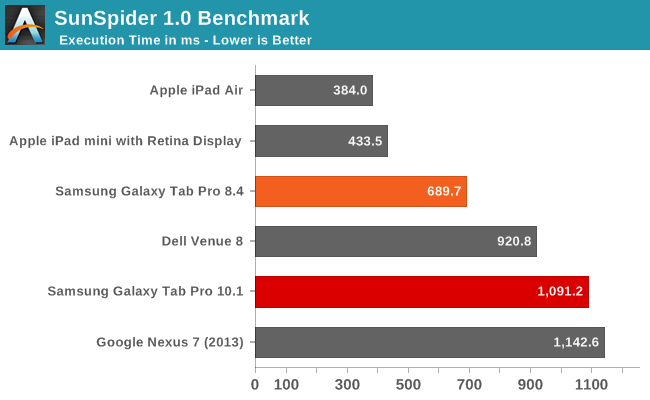
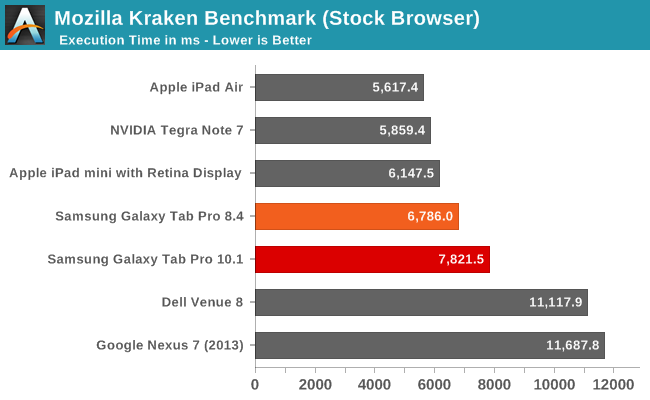
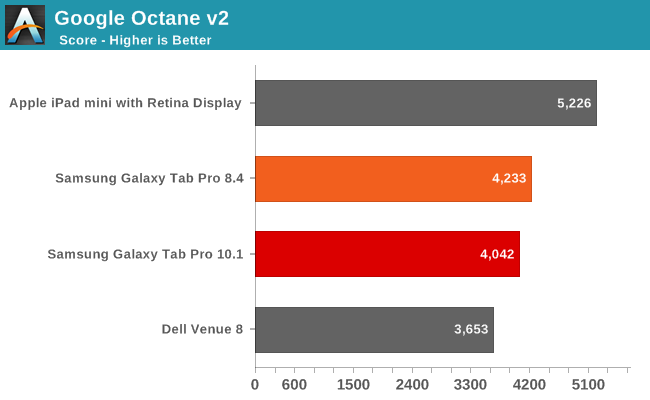
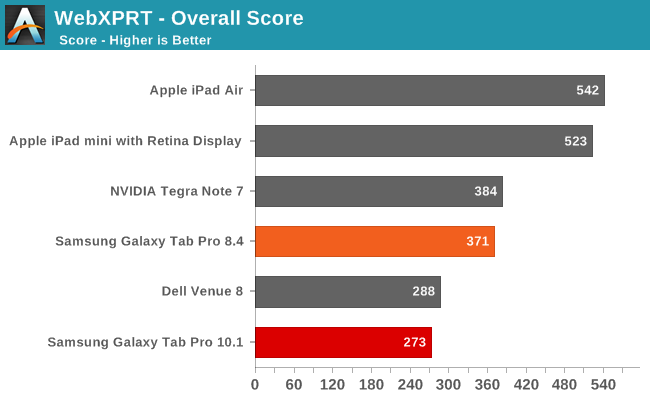
In terms of CPU speed, the Apple A7 chips still take the lead in all of our tests, though not always by a large margin. We’re also using different browsers (Chrome vs. Safari), and JavaScript benchmarks aren’t always the greatest way of comparing CPU performance. I ran additional benchmarks on the two Samsung tablets just to see if I could get some additional information; you can find a table of results for AndeBench, Basemark OS II, and Geekbench 3.
| CPU/System Benchmarks of Samsung Galaxy Tab Pro | |||
| Benchmark | Subtest | Tab Pro 10.1 | Tab Pro 8.4 |
| Andebench | Native | 13804 | 17533 |
| Java | 708 | 790 | |
| Basemark OS II | Overall | 865 | 1062 |
| System | 1542 | 1529 | |
| Memory | 419 | 503 | |
| Graphics | 1032 | 2555 | |
| Web | 838 | 724 | |
| Geekbench 3 | Single | 942 | 910 |
| Multi | 2692 | 2847 | |
| Integer Single | 1028 | 967 | |
| Integer Multi | 3135 | 3343 | |
| FP Single | 897 | 848 | |
| FP Multi | 3106 | 3080 | |
| Memory Single | 860 | 922 | |
| Memory Multi | 982 | 1391 | |
Interestingly, the Samsung Exynos 5 Octa 5420 just seems to come up short versus the Snapdragon 800 in most of these tests. However, there’s a bit more going on than you might expect. We checked for cheating in the benchmarks, and found no evidence that either of these tablets was doing anything unusual in terms of boosting clock speeds. What we did find is that the Pro 10.1 is frequently not running at maximum frequency – or anywhere near it – in quite a few of our CPU tests.
Specifically, Sunspider, Kraken, and Andebench had the cores hitting a maximum 1.1-1.3GHz. The Pro 8.4 meanwhile would typically hit the maximum 2.3GHz clock speed. The result, as you might imagine, is that the 8.4 ends up being faster, sometimes by a sizeable margin. Basemark OS II, Geekbench 3, and AnTuTu on the other hand didn’t have any such odd behavior, with the Pro 10.1 often hitting 1.8-1.9GHz (on one or more cores) during the testing, and when that happens it often ends up slightly faster than the Pro 8.4.
Which benchmark results are more "valid"? Well, that's a different subject, but as we're comparing Samsung tablets running more or less the same build of Android, we can reasonably compare the two and say that the 8.4 has better overall performance. Updated drivers or tweaking of the power governor on the 10.1 might change things down the road, but we can only test what exists right now.
Overall, both systems are sufficiently fast for a modern premium tablet, so I wouldn’t worry too much about whether or not you’re getting maximum clock speeds in a few benchmarks – in normal use you likely won’t notice one way or the other. But we’re only talking about the CPU performance when we say you won’t see the difference; let’s move over to the graphics benchmarks to see how the Galaxy Pro tablets fare.
Graphics Performance
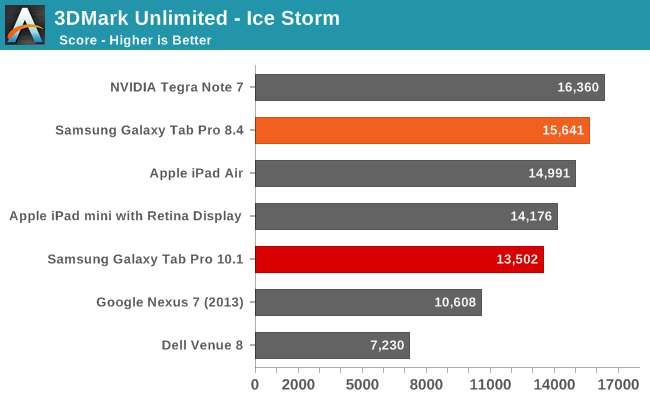
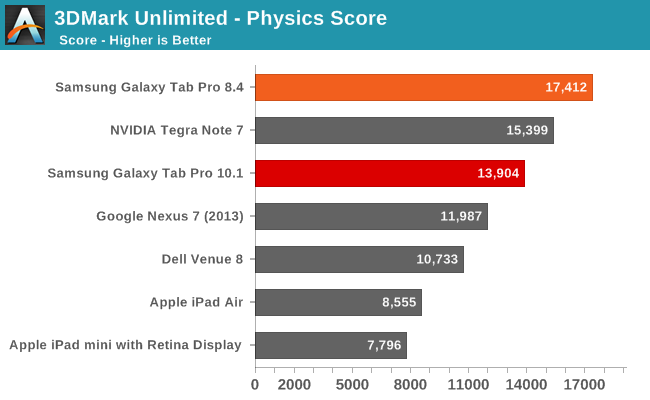
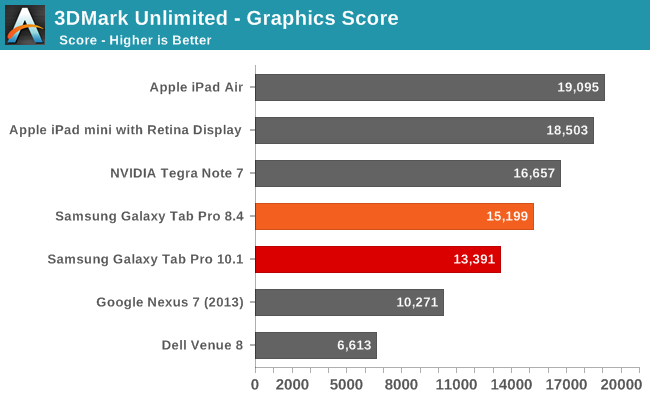
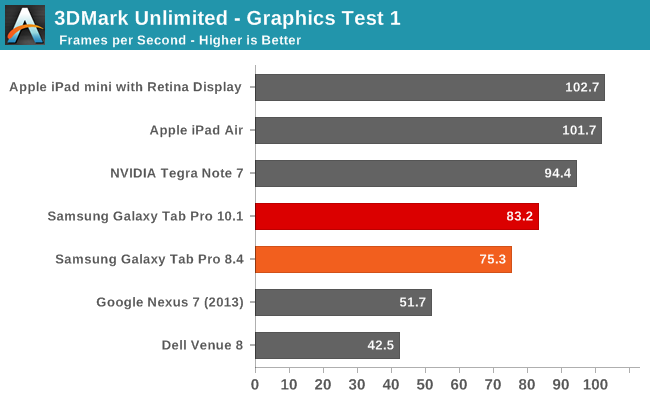
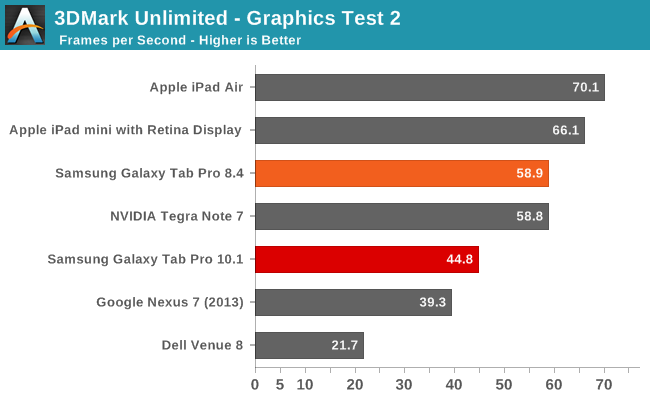
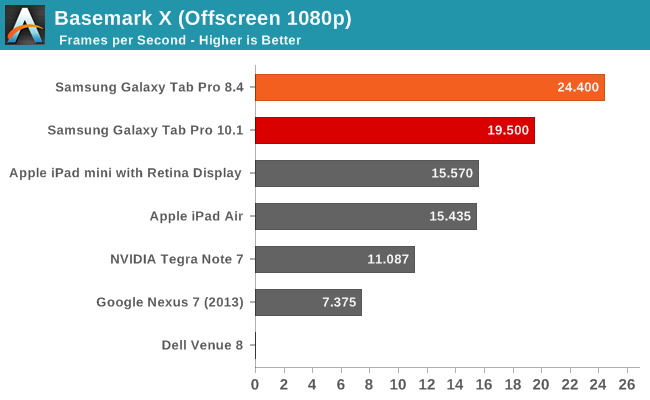
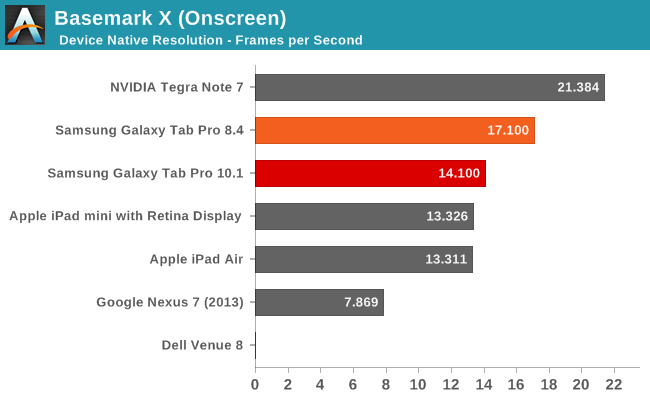
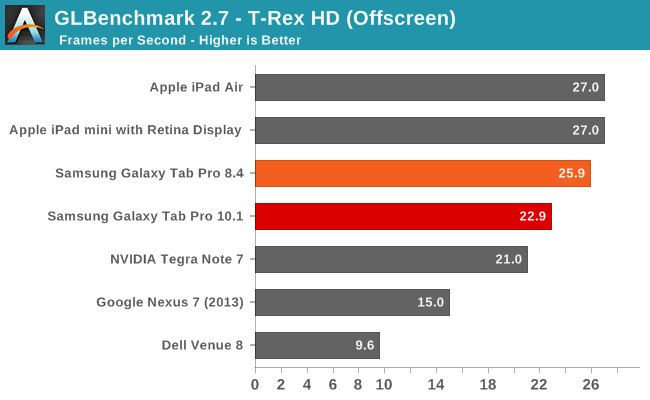
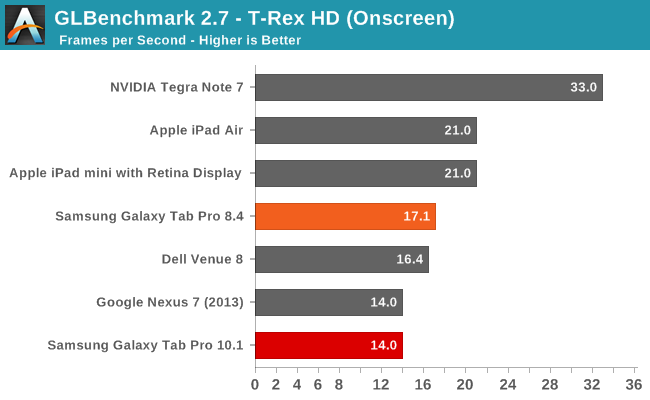
Outside of the 3DMark Unlimited Graphics Test 1 result, the Pro 8.4 sweeps the tables against its big brother. Playing games like Angry Birds Go! or any other reasonably demanding 3D titles in my experience confirms the above results – Adreno 330 beats the Mali-T628; end of discussion. I also had a few quirks crop up with the Pro 10.1 graphics, like Plants vs. Zombies 2 at one point stopped rendering all the fonts properly; a reboot fixed the problem, but I may have seen one or two other rendering glitches during testing. I have some additional results for GPU testing as well via GFXBench 3.0 if you’re interested:
| Graphics Benchmarks of Samsung Galaxy Tab Pro | |||
| Benchmark | Subtest | Tab Pro 10.1 | Tab Pro 8.4 |
| GFXBench 3.0 Onscreen | Manhattan (FPS) | 2.9 | 5.8 |
| T-Rex (FPS) | 14 | 17.1 | |
| ALU (FPS) | 13 | 59.8 | |
| Alpha Blending (MB/s) | 3295 | 6847 | |
| Fill (MTex/s) | 1956 | 3926 | |
| GFXBench 3.0 Offscreen | Manhattan (FPS) | 5.5 | 10.8 |
| T-Rex (FPS) | 22.9 | 25.9 | |
| ALU (FPS) | 25.6 | 138 | |
| Alpha Blending (MB/s) | 3093 | 7263 | |
| Fill (MTex/s) | 1956 | 3780 | |
The new Manhattan benchmark was one of the other tests where the Pro 10.1 didn’t seem to render things properly, and even then the Pro 8.4 ends up with nearly twice the frame rates. The ALU, Alpha Blending, and Fill rate scores might explain some of what’s going on, where in some cases the Pro 8.4 is more than four times as fast. Regardless, if you want maximum frame rates, I’d suggest getting the Pro 8.4 over the 10.1.










125 Comments
View All Comments
Reflex - Sunday, March 23, 2014 - link
Jarred - That is the same issue with anyone who has bought into any ecosystem. Its a valid concern but not one specific to the Kindle. More valid would be that their app selection is significantly smaller, and versions are often out of date (a problem shared by the WP ecosystem). But concerns about switching apply to everyone in every ecosystem equally and are not platform specific. I'd argue that its less of an issue for Android users going to Kindle (and vice versa) since most of the apps can at least be sideloaded or installed via third party marketplace.zepi - Wednesday, March 26, 2014 - link
$100 would be the price of the software. Not the worth of it. Some software can be free, yet insanely valuable. Some companies would easily pay hundred dollars per each linux-installation if they had no other choice, but get them free, because they are worth way more than $100 to their business.Value you get from software is unique to everyone of us and fluctuates over time and is not constant. Value of a flashlight app might be high when you are strolling on a dark beach and forgot your flashlight home (you would easily pay a dollar if no free versions existed), but during a bright summer day on a baseball court you wouldn't pay a penny for such app.
Are there a lot of apps that are actually worth a lot to you and you couldn't get to an amazon device? What is the total cost of reacquiring them?
In the end, we are not rational customers. We count things "we lose" in terms of actual dollars even if in practise none of it would matter at all just because we think it's ours. Psychological research suggest that people hate giving up more than getting new stuff. http://en.wikipedia.org/wiki/Endowment_effect
ESC2000 - Tuesday, April 1, 2014 - link
Go look at the new study showing that Apple apps crash 2+ times more than android apps even though apple's store is curated and Google's is a "free for all."Mondozai - Sunday, March 23, 2014 - link
Lighter, high quality displays, top specs and cheaper.The drawback of the Android store is an issue but on basically every other metric they are better.
Also, Reflex, even if Amazon is not as cavalier about privacy as Google, people are right that you are a bit too trusting. Their TOS isnt necessairly 100% honest/transparent.
Reflex - Sunday, March 23, 2014 - link
While it is true that Amazon could be lying, as could any company's TOS and privacy policy, that would be legally actionable and on that basis you simply cannot trust anyone anywhere and should just unplug from the internet. Companies can and are sued for violating TOS/Privacy Policies, as LinkedIn recently found out and as Facebook is finding out in Europe.Yes, Amazon could be lying to us all. But that is no different than anyone else, and if you find out that they are, its time to retain an attorney and start a class action.
lakawak - Monday, March 24, 2014 - link
Wow...I am not Google fan, but you are extremely ignorant if you think Amazon is leaving tens of millions of dollars a year on the table by not selling advertisers the habits of Kindle users. How do you think they make more of their money on Kindle? It is not a huge profit margin device. And all those free apps? Howe do you think those are paid for? The kindness of strangers?Amazon's MAIN business model this to sell things to you. That doesn't mean they don't have a second business model with the Kindle of selling YOU to advertisers. They do.
darwinosx - Saturday, March 22, 2014 - link
More cheap derivative junk from Samsung that will be in the bargain bin in a month or so.JarredWalton - Sunday, March 23, 2014 - link
And I suppose everything is derivative these days, except for apple? But it's more like expensive, nicely designed, and not likely to end up in the bargain bin until the next update comes out.Nfarce - Sunday, March 23, 2014 - link
Don't you mindless Appletards have anything better to do?akdj - Monday, March 24, 2014 - link
Ever tried to sell a year or two old Android device? iOS? There's a night and day difference and I use both platforms equally. I upgraded to the 5s and Note 3 last fall. Sold the Note 1 (a pair) for $135. The almost three year old iPhone 4s went for $345 locally on Craigslist. Something to be said for resale and has nothing to do with 'AppleTards' :rolleyes: